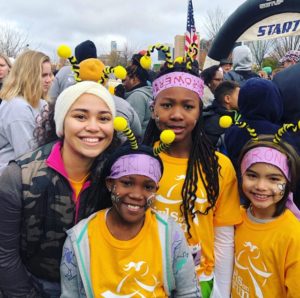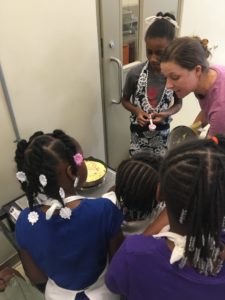By: Javacia Harris Bowser
When Erin Utz was accepted into the Albert Schweitzer Fellowship for the 2024-2025 term, she knew she wanted to embark on a project to improve medication access for an underserved community. However, the Auburn University Harrison College of Pharmacy student intentionally didn’t come into her fellowship year with a specific plan.
For her project, Erin is teaming up with Mercy Medical Clinic in Auburn, and she wants the patients and the providers there to guide her work. So, to kick things off, she has been interviewing patients to find out exactly what barriers keep them from accessing the medications they need.
Erin has asked patients about the factors that impact whether or not they seek medical care such as transportation or the availability of a healthcare provider. She asks about prescription costs and if they’ve used any resources such as Good Rx coupons or prescription assistance programs to help with purchasing medication.
“My goal is to get at least 30 participants and right now I’m about halfway there,” Erin shares. Next, she’ll interview healthcare providers to get their input as well.
“I’m also going to do a survey afterward with the providers at the clinic to find out what they believe can help address the patients’ barriers,” Erin says. “So that’s really going to mold what I want to do for my project.”
Erin suspects that the primary barrier to medication access for patients at Mercy Medical Clinic will be cost.
“Some medications can be really expensive,” she says.
She’s seen this firsthand. Erin works in the pharmacy at a local Wal-Mart.
“We get a lot of Mercy’s patients at our pharmacy coming to pick them up their medication and whenever they don’t have insurance and the cost is over $100 they can’t get it,” she explains. “But it’s often a medication they need in order to manage a chronic health condition that uncontrolled can be life-threatening. It’s disheartening to see anytime that happens.”
She says she wishes she could just pay for the medication herself but she knows she can’t. What she can do is try to make a difference through her Albert Schweitzer Fellowship.
It was Mercy Medical Clinic that inspired her to pursue pharmacy.
“Before I started pharmacy school, I had shadowed my academic advisor Jeanna Sewell at the clinic, just to make sure I wanted to do pharmacy, and I just fell in love with what she did there and the way she helped the patients and the way the whole clinic was functioning,” Erin says. “I’m not doing this for money; I’m doing this to help patients.”
Once she finishes school, Erin hopes to work in a clinic that serves underinsured patients. She believes her ASF project will help prepare her for this work.
“I will learn how to develop and implement a service project so when I go on and graduate into my own career, if I see a need, I will understand and know the steps to create a way to address it,” she says.
Erin has already been investigating possible solutions to the barrier of medication cost. One idea she was excited about – automatic refills on prescriptions provided by an organization that supplies free medications to clinics across the country and around the world – hasn’t worked out. But Erin knows that her fellowship year won’t be without challenges and that nearly every project must pivot.
She’s ready to broaden and shift her plans if needed.
“It’s not just the patients at Mercy that need help with medication access,” she says. “There are plenty in our community.”
She’s hoping to use Mercy Medical Clinic as a hub to make an even bigger impact. But she’s also ready to switch her focus if needed.
“I’m just being open and willing, even if I need to completely shift from medication access to something completely different,” she said. “I’m okay with that as long as I’m making a difference somewhere.”



